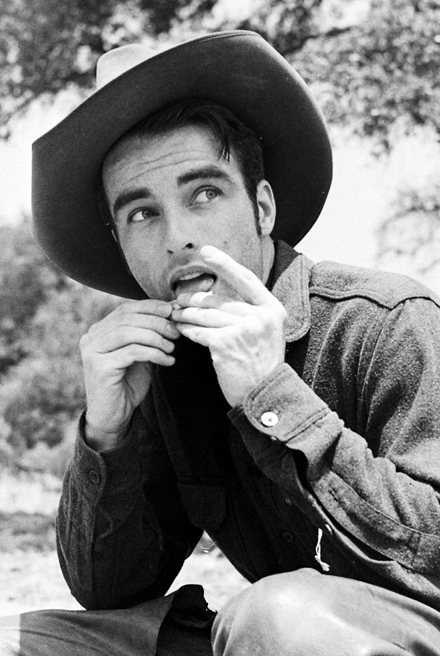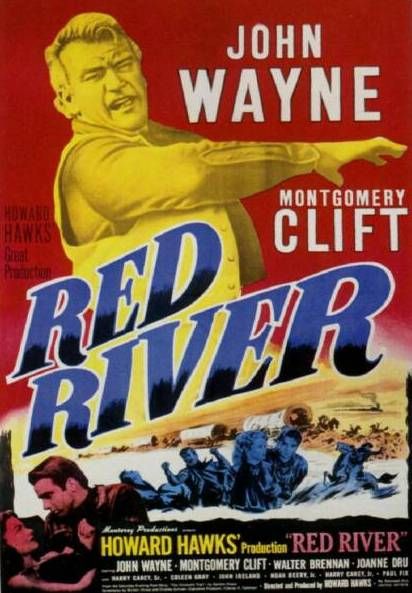by Nathaniel R


I watched myself in Red River and I knew I was going to be famous, so I decided I would get drunk anonymously one last time."
- Montgomery Clift to the novelist James Jones (From Here to Eternity)
Cliff is an arrogant little bastard."
- John Wayne to a Life Magazine reporter.
While The Search (1948) was the first chance for moviegoers to see the rising actor Montgomery Clift on the screen, it was actually the second movie the young actor shot. His trial run in Hollywood came shortly before his 26th birthday, as he ditched Broadway to head to the Arizona desert for a John Wayne western. The film was Howard Hawks' Red River. It's possible that Hollywood didn't know that the film would prove to be a sensation with audiences, but word quickly spread that Wayne's debut co-star would.
By most accounts John Wayne and Montgomery Clift didn't get along but sometimes that works for a picture rather than against it...
In the prologue set in 1851, Dunson (John Wayne) breaks off from a wagon train to grab land for himself and raise cattle. He then "adopts" the lone survivor of a wagon train massacre named Matt (child star Mickey Kuhn), and even in their first meeting there's violence and a stand-off. Cut to ten years later and Matt is now a full grown man in the shape of Montgomery Clift.
Here's his first close-up, obsessed over by fans ever since. His first line of dialogue is a single word.

"Missouri"
He's talking about cattle drive routes but no one can hear a word he's saying; it's not because he's mumbling (though he is inspiring a whole new generation of future Method superstars like Marlon Brando) but because no one is thinking of anything but his mouth.
The plot (and latent sexual sparks), about a dangerous cattle drive and an eventual mutiny from Dunston which Matt will lead, really starts to kick up dust when a new hired hand by the name of Cherry Valance (John Ireland, swaggering) arrives. Their introduction has been much-discussed in gay and academic film circles since. After vaguely threatening each other, they walk into camp together where Cherry does all the talking.

That's a good looking gun you were about to use back there. Can I see it?
[Matt pauses, rubs his nose, half smiles, and whips it out.]
Maybe you'd like to see mine?
[They trade guns and Cherry moves Matt's around in his hand]Nice. awful nice. You know there are only two things more beautiful than a good gun: a Swiss watch or a woman from anywhere.
[They smile at each other]...Ever had a good swiss watch?
This scene was discussed in the 1995 documentary The Celluloid Closet which looked at the way homosexuality had always slipped into the movies, sometimes with the stars in the know (as with Stephen Boyd's delicious work in Ben-Hur) and other times with directors or screenwriters adding it in subtly when they could escaping the censor's notice.
Now, it's easy to graft new meanings onto old movie dialogue -- especially the ones featuring closeted queer stars like Rock, Cary, or Monty -- but The Celluloid Closet wasn't stretching with Red River. It's nearly impossible to read without a queer lens, once you've caught wise to it. If there was any doubt about what's happening (or about to happen) between Matt and Cherry as they compare phallic symbols, the dialogue between the old traditional cowboys that bookends the scene makes it even clearer.

John Wayne before the scene, when asked what's going to happen between Matt & Cherry:
They'll just paw at each other and find out what they're up against. It'll be worth seeing.
Old Groot (Walter Brennan) after the scene when asked what the shooting was about:
They was having some fun. [Confused] A peculiar kind of fun. Sizing each other up for the future. Them two's gonna tangle for certain and when they do it ain't gonna be pretty.
Groot might be misreading or simplifying it but the world tangle is deliciously interpretable. His uncomfortable laugh suggests that he doesn't quite get what's happening even while describing it.
Of course this is still a pre Stonewall movie, pre pre pre in the studio era, so Red River drops the intensity around Cherry and Matt's 'friendship' for the second half of the movie. They never tangle in the way Groot predicts, remaining fiercely loyal. There's one more comment from Cherry later in the movie about how fond he's grown of Matt's gun, but mostly they're partners on the trail and it's even lightly implied that the love interest Matt is given in the third act, Tess Millay (Joanne Dru), is a hand-off from Cherry. Sharing a woman so amicably is more than a little eyebrow raising for 1948.

But what made Clift such a fascinatingly disruptive "new" kind of male idol at the movies was just this queerness... though it couldn't be named that in 1948. Wayne and even Cherry both call him "soft" in the movie despite how lethal Matt's gun is. And "soft" to describe this wiry actor, who, those lips aside, had all kinds of hard angles, intense quick moving eyes, and a potent physicality? Director Howard Hawks and his screenwriters also keep us fully aware that Matt may have grown up on the merciless trail alongside this larger than life movie star of the open vistas (Wayne's Dunson) but he's morally sensitive and doesn't like all the killing. Soft in his heart... which is a good thing... albeit a good thing that's disruptive to a man's man's western.
Clift would have compelling love scenes with women in later movies but in the context of the birth of his career, his love scene with Joanne Dru has a fascinatingly non-committal or androgynous feeling. She's the agressor. He's the one whose lying prone. She caresses his lips and hovers over him, totally in power for their first kiss. In most movies the male and female star would flip flop positions, there.

Clift was reportedly disappointed in his own performance and the film. But such was the magic of this Howard Hawks western that, whatever the studio interference, long shoot compromises, and mixed sexual messages, it totally works. As a cultural text about opposing styles of masculinity and the evolution of queer stardom, made immediately following World War II when gender norms were suddenly in flux, it's unmissable.
Clift hated the ending, too, but perhaps he was wrong about it. Dunston is furious that Matt won't draw (Matt loves Dunston like a father) and fires several warning shots. All the while he's angril shouting that he's SOFT.
"Won't anything make a man out of you?"
Dunston/Wayne was missing the forest for the trees. Matt/Monty was already a man, a formidable one, too, but a new kind. Clift's enormous talent, reported arrogance, and discomfiting persona -- often playing men who didn't quite fit as he shifted uncomfortably in his own skin -- weren't too everyone's liking. Certainly not Wayne's. But a new era was coming.

Clift's stardom was instaneous. Look Magazine called him "the hottest actor since Valentino" and in the New York Times, Caryl Rivers reminisced:
All the girls in the eighth grade fell in love with Montgomery Clift in Red River. His face had the perfection of a fragile porcelain vase. His beauty was so sensual and at the same time so vulnerable it was almost blinding."
Though Red River was in the can almost two years before its release, word spread quickly and Clift landed an unheard of contract for such an unproven newbie, refusing to tether himself to the then common long term studio contracts. Hollywood was his. But what would he do with it?
Red River is currently available to stream on Amazon Prime.
next: The Heiress (1949) now streaming on Criterion Channel
All Episodes Index